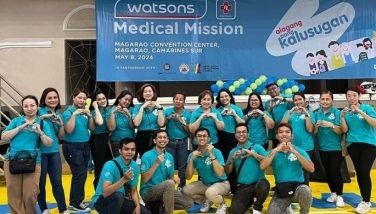DPWH statement on World Bank controversy
(Editor’s Note: This is the DPWH statement that Secretary Hermogenes Ebdane was supposed to read at the Senate hearing last January 27 but had been unable to do so because of circumstances prevailing at the hearing at the time).
Cebu - We welcome this opportunity to provide relevant information on the subject of Senate Resolution Numbers 218, 220 and 830.
The first two, Senate Resolutions 218 and 220, refer specifically to the deferment of the $232 million World Bank soft loan. We would like to respectfully inform the Senate that the subject $232 million involves Phase 2 of the National Roads Improvement and Management Program or NRIMP 2 which was approved in May 2008 and is not on-going.
One Senate Resolution 830, we would like to inform the body that after our inquiry with the Department of Justice, their legal opinion is that RA 9184 otherwise known as the Government Procurement Act, is not binding on foreign-funded projects.
With these updates on the issues at hand, we would like to talk briefly about key points of the World Bank-funded NRIMP, Phases 1 and 2.
NRIMP1
NRIMP 1 was a $150 million loan, implemented from February 2000- March 2007, with 10 projects resulting in the construction of 1,4000 kilometers of roads.
Of the 10 projects, 2 projects were dropped in view of 3 successive failures of bidding. Upon the recommendation of the Department of Public Works and Highways to Her Excellency President Gloria Macapagal-Arroyo, the Philippine Government decided to withdraw these 2 projects from World Bank funding because of the pressing schedule for completion.
The recommendation to drop these projects from NRIMP1 was precipitated by the World Bank letter to DPWH that in view of the alleged collusion they did not concur with the results of the bidding.
This memorandum for PGMA dated November 5, 2006 emphasized that with the withdrawal of these 2 projects from NRIMP, substantial savings will be realized.
To quote from the Memorandum for the President dated November 5, 2006:
“The advantages of RA 9184 can be fully realized such as:
a) Award of Project shall be limited to the approved budget of the contract unlike in foreign-funded project where the award may reach up to about 25% of the ABC. For the above projects, a saving of about P500M could be realized.
b) Variation order shall be limited to 10% of the Contract Price. For the above projects, a savings of about P240M could be realized.
c) No provision in the contract for price escalation. For the above projects, a savings of about P490M could be realized.
d) Interest payment for delayed payment of billing is not allowed.
Cost of construction supervision is minimized once supervisionwill be undertaken of DPWH engineers instead of foreign consultants. A savings of P85M could be realized.”
The amount involved for these 2 projects was $33M, out of the total $150M total of NRIMP1. When Phase 1 was completed, 2 out of 10 projects had been cancelled.
Upon review of these projects, they were repackaged into three projects: one, CW-RU, Rehabilitation of Surigao-Davao Coastal Road (Marihatag-Barobo/Tagbina-Hinatuan); two, CW-RU-1.6A, Rehabilitation of San Enrique-Vallehermoso Road (La Castellano-Canlaon Section); and three, CW-RU-1.6B, Rehabilitation of Kabankalan-Basay Road (Hinobaan-Basay Section). Once we gained the approval of President Arroyo, local funding was allocated and the bidding was conducted locally in the areas of the projects themselves.
To-date, we have completed the Rehabilitation of San Enrique-Vallehermoso Road and the Rehabilitation of Kabankalan-Basay Road, plus two sections of the Rehabilitation of Surigao-Davao Coastal Road. Three sections are on-going and targeted for completion by the end of 2009
Because of the withdrawal of these projects, WB cancelled the $33M portion allocations for same and initiated further investigation on the alleged collusion by their Department of Institutional Integrity of INT.
The copy of these results have been transmitted to the Ombudsman through the Department of Finance so the Philippine Government can look into the administrative and criminal aspects of matter. Furthermore, the World Bank issued a public statement on the debarring of the contractors.
Actions Taken
Given the turn of events in NRIMP1 the DPWH has taken a number of steps to address the issues raised with regard to malpractice and other anomalies.
After the first round of failed biddings, we created a committee to investigate the allegations on collusion, chaired by then Officer-in-Charge, Director of Internal Audit Service Camilo Foronda, in June 2003.
In December 2003, the DPWH initiated an Independent Call Line system with Procurement Watch, Inc. taking on the challenge of being the NGO watchdog, particularly to report the complaints and other feedback on the rebidding of the project.
In 2004, further revisions were incorporated into the procurement procedures with the agreement of the World Bank.
These include the advertisement of projects in the United Nations Development Business newsletter and dgMarkets, and the inclusion of contractors for NRIMP1 in the Civil Works Registry, both of which boost transparency in the process.
NRIMP 2
Since the November 2007 announcement of the deferment of the discussions for NRIMP2, the DPWH has been in pro-active discussions with the World Bank on how to address the collusion perception issue.
We believe that we have been able to show the sincerity of our efforts to learn from past experiences and have been successful in obtaining approval of NRIMP2 in May 2008.
As a backgrounder, Phase 2 of NRIMP involves 14 projects with a budget of $232 million under three different components.
One component focuses on National Road Improvement of 450 km of national arterial roads and related bridges, including the upgrading of 146 km and rehabilitation of 304 km.
Another aspect tackles Road Asset Preservation with the institutionalization of a road maintenance program through long-term performance-based contracts and preventive, routine and emergency maintenance.
We also have another on Institutional and Capacity-development, enabling the upgrade and modernization of the processes and operations of the DPWH, and targeting improved organization effectiveness and integrity of public road management in services of the DPWH.
Under the Institutional and Capacity-development, there is also included a sub-component for Strategic Sector Reform, focusing on strengthening the operations of the Road Rund and the framework for subsequent sector restructuring.
NRIMP2 Safeguards
With the approval and signing of the agreement, the DPWH has instituted project-specific measures that are intended to deter collusion and prevent further opportunities for corruption.
These are:
First, the adoption of post-qualification procedures that will determine the contractor’s capability after bids are submitted. While there are pre-qualification requirements, the post-qualification procedures protect the process. This also encourage the participation of more bidders, and indicator that the process is healthy and viable.
Second, the full participation of our NGO partner Bantay Lansangan or Road Watch which is supported by Australian Aid (AusAid), our institutional partner in capability-building. Bantay Lansangan is fulfilling its mandate to check on the procedures and process of on-going and future projects of the World Bank and other ins-titutions.
Third, the organization of a new Project Management Office for World Bank NRIMP2 headed by Undersecretary Romeo Momo and Director Carlos Mutuc.
Fourth, the presence of additional observers during the bidding, including representation from the Church.
Fifth, the use of Independent Procurement Evaluators, Independent Technical Audit, Financial Management Advisors, Organizational Effectiveness Advisors and Internal Audit Strengthening, all co-financed by institutional partner Australian Aid (AusAid) to improve transparency and integrity of the procurement process.
We conducted the first bidding for NRIMP2 last Wednesday, 21 January 2009, with representative from the Commission on Audit, Bantay Lansangan, other NGOs as well as the media.
Closing
While it took an independent entity such as the World Bank to point out further weakness, their participation emphasizes the importance of vigilance and assertiveness to prevent any further opportunities for collusion and corruption.
We believe that there must be collective responsibility to safeguard the process against malpractice and other anomalies. This is why we have continually reached out to as many concerned sectors as possible and welcome their involvement to take part and take responsibility for the process.
Public interest can best be protected if vigilance becomes not the exception but the standard.- THE FREEMAN
- Latest
- Trending














